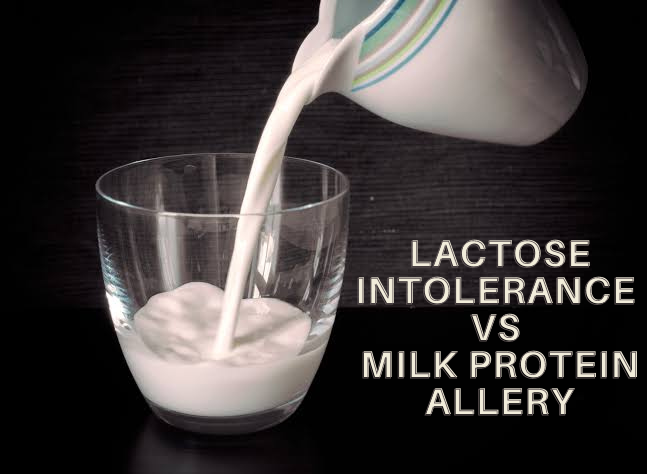
LACTOSE INTOLERANCE VS MILK PROTEIN ALLERGY
Milk is the first food for babies. But despite it being a complete package of beneficial nutrients there are few babies who won’t be able to tolerate milk and consumption of the same would cause them discomfort. The aim of this article is to build awareness of what could cause sensitivity to milk and how you can support your child’s nutrition intake.
One common reason for intolerance to milk is the very famous lactose intolerance. This happens because of deficiency of enzyme lactase which digests milk sugar (lactose). The undigested lactose stays in the gut and causes the symptoms like bloating, flatulence, diarrhoea, abdominal pain, an hour or two after consumption. Lactose intolerance can be –
- Primary Lactose Intolerance – relative absence of the enzyme that digests lactose. This kind is the most common and is natural; can present itself at any age.
- Secondary Lactose Intolerance – happens due to an underlying condition or its treatment.
- Congenital Lactose intolerance – is a very rare scenario, where babies are born with lactase deficiency.
- Developmental (neonatal) Lactose Intolerance – observed in preterm infants because their digestive system hasn’t fully developed yet.
Cow’s Milk Protein Allergy, is when the baby develops immune mediated response to milk proteins. This is a more common form of allergy observed in babies and toddlers after exposure to cows milk or sometimes even with mother’s milk. It exhibits as :
- digestive symptoms- abdominal pain, bloating, flatulence, stool changes
- skin rashes
- fever within minutes of ingestion and watery eyes
- can also have nutritional manifestations like malabsorption and deficiencies
When children exhibit symptoms of intolerance/ allergy the treatment is to eliminate any sources of lactose and milk protein respectively. Not just with milk and its products, commercial formulas made using milk solids, breads, cakes, biscuits, chocolates and other processed food would also contain Lactose and Milk Proteins – care should be taken to avoid any triggers.
Milk can be replaced with lactose free substitutes or other plant based milk. Most children with Lactose Intolerance will be able to digest fermented milk products like curd and yogurt. Dairy serve as the principle sources of protein and other nutrients essential for growth and development. Eliminating milk and its products would take away one of the child’s major sources of micro nutrients – calcium, phosphorus, B Complex, Vitamin K, Vitamin D from the diet and it is important to focus on other food sources and professional prescribed supplementation to prevent deficiencies.
Both Lactose Intolerance and Milk Protein Allergy are common but usually temporary conditions (except for congenital lactose intolerance) and most babies can be gradually be reintroduced to milk slowly. Ensure you seek professional help to understand your child nutritional status and how you can help the child achieve adequate intake in spite of having to eliminate certain groups of food.
SUJATHA S
(REGISTERED DIETITIAN, CHENNAI)
REFERENCES:
- Aktaş S, Ergenekon E, Ünal S, Türkyılmaz C, Hirfanoğlu İM, Atalay Y. Different presentations of cow`s milk protein allergy during neonatal period. Turk J Pediatr. 2017;59(3):322-328. doi: 10.24953/turkjped.2017.03.015. PMID: 29376580.
- Brill H. Approach to milk protein allergy in infants. Can Fam Physician. 2008;54(9):1258-1264.
- Harvey L, Ludwig T, Hou AQ, Hock QS, Tan ML, Osatakul S, Bindels J, Muhardi L. Prevalence, cause and diagnosis of lactose intolerance in children aged 1-5 years: a systematic review of 1995-2015 literature. Asia Pac J Clin Nutr. 2018;27(1):29-46. doi: 10.6133/apjcn.022017.05. PMID: 29222879.
- Heyman MB; Committee on Nutrition. Lactose intolerance in infants, children, and adolescents. Pediatrics. 2006 Sep;118(3):1279-86. doi: 10.1542/peds.2006-1721. PMID: 16951027.




